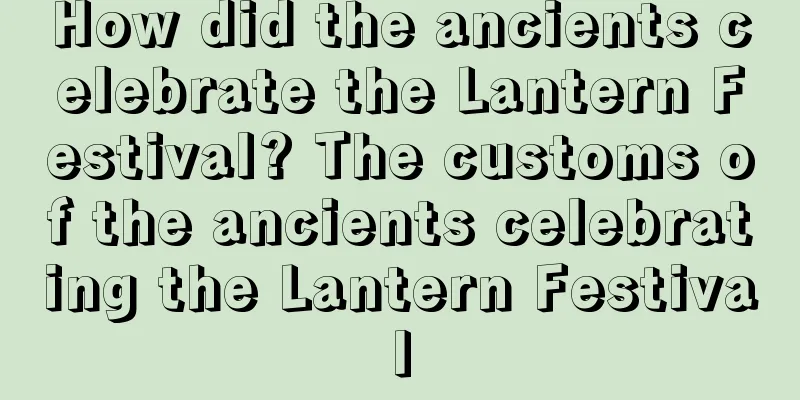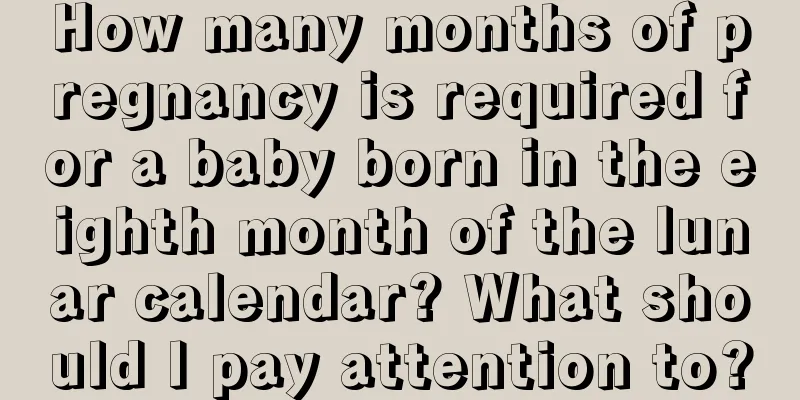How did the ancients celebrate the Lantern Festival? The customs of the ancients celebrating the Lantern Festival

Introduction: The Lantern Festival is one of the major traditional festivals in our country, and the Lantern Festival has a long history in our country. So, how did people in ancient times celebrate the Lantern Festival and what were the customs? Now, let’s follow the editor to learn about it. The first month of the lunar calendar is the beginning of spring, and there are beautiful festivals everywhere in this month. Mr. Shui Mo lists these traditional Chinese festivals and customs for you one by one.How did the ancients celebrate the Lantern Festival? The customs of the ancients celebrating the Lantern FestivalAccording to the "Shenyijing", there is a mountain gourd in the western mountains. If you offend it, you will feel chills and fever. But it was afraid of the sound of bamboo popping, so people burned bamboo to drive it away. Lai Hu, a poet in the Tang Dynasty, wrote in his poem: "The new calendar has just been half opened, and the small courtyard is still filled with ashes from firecrackers." Wang Anshi, a poet in the Song Dynasty, wrote in his poem: "The year is gone with the sound of firecrackers, and the spring breeze brings warmth to Tusu." After the invention of gunpowder, people still set off firecrackers during the Spring Festival.In the Song Dynasty, people used business cards to send New Year greetings, which were called "flying cards." A red paper bag with "Receive Blessings" written on it is posted in front of every house to hold the flying invitations. The Qing Dynasty's "Yantai Monthly Order" also described Beijing as "In this month, films fly and empty carriages go." Modern New Year's cards can be said to be its legacy. "Wulin Jiushi" and other books record: "Poems were written on silk lanterns, which were full of ridicule. People also drew figures, cryptic sayings, and old Beijing jokes to tease passers-by. During the Lantern Festival, the imperial city never sleeps. There are all kinds of performances at the lantern viewing parties in the spring nights. Poems and riddles were written on lanterns, reflected by candles, and displayed in the streets for everyone to guess; that's why they were called lantern riddles." Riddle lovers even organized riddle clubs. Riddle societies were also extremely popular during the Qing Dynasty. For example, during the Guangxu period, there were riddle organizations such as Zhuxi Houshe, Shehushe, and Pingshe, where many riddle makers gathered and used teahouses, taverns, or their own private homes as venues for riddle activities. They would study and discuss, or hang lanterns and riddles to attract guessers and entertain the public. The riddle lantern has four sides, three of which are pasted with questions and one side is pasted on the wall. This lantern is also called a wall-bouncing lantern. The person who guesses correctly will reveal the lot and receive a small gift as a souvenir. According to folklore experts, in ancient China, the Lantern Festival was a romantic festival when lovers would meet under the lanterns. Some areas still retain the Lantern Festival custom of "stealing vegetables to express love". In ancient times, the Han people had the custom of stealing vegetables to pray for a child or a son-in-law during the Lantern Festival. To this day, the Miao people in Huangping, Guizhou Province still retain the custom of stealing vegetables to express love on the fifteenth day of the first lunar month every year. On this day, girls will steal vegetables from the opposite sex who are not from their own family, hoping to "steal" a good marriage. The fifteenth day of the first lunar month is the first full-moon night of the year, so it is called "New Year's Eve Night". Taoists regard the fifteenth day of the first lunar month as the Lantern Festival. The custom of celebrating the Lantern Festival has existed as early as the Han Dynasty, and it became even more grand in the Tang Dynasty. During the reign of Emperor Ruizong of Tang, a lantern tree twenty zhang high was built on the Lantern Festival with fifty thousand lanterns lit, and it was called the "Fire Tree". "Jinwu does not ban the night" means that the capital city made an exception and cancelled the nighttime curfew, allowing citizens to enjoy the lantern show for three whole nights, also known as "lighting lanterns." "Walking away all diseases" is also known as "roasting away all diseases", "strolling away all diseases" and "dispersing all diseases". In the old days, on the night of the Lantern Festival on the 15th day of the first lunar month, and especially on the whole day of the 16th day of the first lunar month, women would go out in groups of three or five. They would stroll and enjoy the lanterns, while taking a walk to get rid of all diseases. This is an activity to ward off disasters and pray for health. It is generally believed among the people that when "walking away all diseases", one must also "touch the door nails" in order to pray for good luck and get rid of the disease. "Touching the door nails" is also known as "touching the nails". Because "ding" is homophonic with "ding", and "ding" symbolizes man. Therefore, on the night of the fifteenth day of the first lunar month, women went out and went to the city gates to "touch the door nails." They had to grope in the dark without any lighting equipment. Those who touched the door nails at once were considered a good omen for giving birth to a child. People would not go to the city gate to touch the nails, but would go to the temple to burn incense and touch the nails on the temple gate with their hands to pray for the prosperity of their family. Summary: Through the above article, we learned about some customs of the Lantern Festival in ancient times. I hope you will like it. I wish you all good luck and peace in the new year! After reading this article, there are more exciting contents in the special topic of the first month of the lunar calendar. Let’s take a look! |
<<: How is the financial fortune for Aries who go back to work after the Spring Festival holiday?
>>: How do people in Northeast China celebrate the Lantern Festival?
Recommend
What are some good days for praying in the first month of 2020? When does the first month of the year begin?
The first lunar month is the first lunar month of ...
Is it auspicious to move the day after New Year's Day 2020? Is the day after New Year's Day 2020 Laba Festival?
Introduction: You also need to choose an auspiciou...
Is August 22 of the lunar calendar 2022 a suitable date for engagement? What should the woman prepare?
Spring, summer, autumn and winter make up a year. ...
Is it an auspicious day to get a haircut on the Winter Solstice in 2019? Which day of the nine-day counting period is the Winter Solstice?
Introduction: Sometimes, getting a haircut also re...
The Spring Festival is not only celebrated in China! Which other countries also celebrate the Spring Festival?
Introduction: The Spring Festival is one of the mo...
Do people born on the second day of the second month of the year of the Tiger, when the dragon raises its head, have good fortune?
On the second day of the second month, the dragon ...
What is the zodiac sign for people born on April 26th of the lunar calendar in 2022? What is men’s view on marriage?
The fourth month of the lunar calendar has arrived...
What should not be done on the Dragon Boat Festival on the fifth day of the fifth lunar month in 2019? Why do we eat rice dumplings on the Dragon Boat Festival?
Introduction: The Dragon Boat Festival is an ancie...
What day is Bailu? Is Bailu the solar term with the largest temperature difference in the year?
Introduction: Bailu solar term is one of the impor...
Query the position of the God of Happiness on the 24th day of the first lunar month in 2018
1. What day is the 24th day of the first lunar mo...
Is it not appropriate to hold a funeral on April 26th, 2020? What are the taboos to pay attention to during the funeral?
Introduction: According to the traditional customs...
Detailed explanation of the custom of welcoming the God of Wealth on the fifth day of the first lunar month and precautions for welcoming the God of Wealth
Introduction: Do you know that during the New Year...
What is the zodiac sign of people born on April 15th of the lunar calendar in 2018? What can they do when they are unhappy?
April is also known as Mengxia, Yinyue and Meiyue....
Is it a good idea to move into a new house on the eleventh day of the first lunar month in 2020? Is it an auspicious day for moving?
The auspicious day for moving should be analyzed ...
Can couples have sex during the winter solstice? What is the saying about not having sex during the Winter Solstice?
Introduction: The arrival of the Winter Solstice i...









